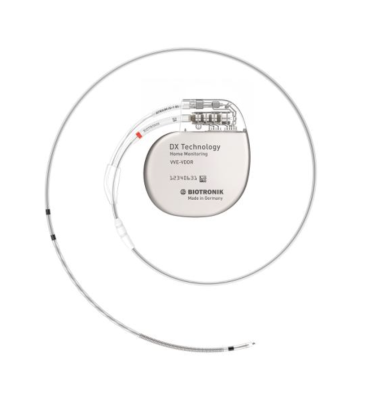
February 12, 2024 — BIOTRONIK, a leader in implantable medical device technology, announced today they will solely supply their proprietary DX models for new single-chamber ICD implants moving forward. The move is being made in response to overwhelming recent clinical data demonstrating superior diagnostics and decreased complication risk of DX compared to traditional high-voltage systems.1-4
“Based on the current evidence, it is clear we must focus on what is proving to be a lower risk technology with added benefits,” said Dr. Alexander Uhl, BIOTRONIK CEO. “Therefore, we have made the decision to offer only DX technology for new patients needing a single-chamber ICD, providing equivalent therapies along with additional atrial monitoring data, as recommended by current guidelines.”
The guidelines for atrial fibrillation (AF) from the American Heart Association (AHA) in 2019 and the European Society of Cardiologists (ESC) in 2020 recommend continued monitoring and evaluation for patients with atrial high-rate episodes (AHRE), with the ESC noting a preference for remote monitoring.5,6
“We are very proud that our DX technology provides the only lead available on the market offering both ventricular pacing/defibrillation and atrial monitoring,” said Ryan Walters, BIOTRONIK US President. “Due to DX´s ability to provide additional patient and clinical benefits, it became clear to us that we should be using DX technology with every BIOTRONIK single-chamber ICD.”
Paired with BIOTRONIK’s Home Monitoring®, DX allows a physician to identify, assess and reliably monitor a patient’s AF burden and subsequent disease progression over time. Earlier identification allows for earlier intervention and improves clinical outcomes.4,7 DX has shown superior AHRE detection compared to single-chamber ICDs, equivalent AHRE detection compared to dual-chamber ICDs, and in the recently published MATRIX study, 1 a 99.7% positive predictive value of AHRE detection in episodes greater than one hour.2
“The MATRIX study is the most recent and largest DX study, adding to the expansive evidence base supporting DX superiority over the ten years of DX being offered in the market,” says Chief Medical Officer, Dr. David Hayes. “There’s simply no reason to implant a traditional single-chamber ICD when the DX system provides the same standard of care with the additional guideline-recommended atrial monitoring benefits.”
For more information: https://info.biotronik.com/dxtechnology
References:
- Thomas G, Choi DY, Doppalapudi H, et al. Subclinical atrial fibrillation detection with a floating atrial sensing dipole in single lead implantable cardioverter-defibrillator systems: Results of the SENSE trial. Journal of Cardiovascular Electrophysiology, Volume 30, Issue 10, October 2019, Pages 1994–2001.
- Hindricks G, Theuns DA, Bar-Lev D, et al. Ability to remotely monitor atrial high-rate episodes using a single-chamber implantable cardioverter-defibrillator with a floating atrial sensing dipole. EP Europace, Volume 25, Issue 5, May 2023, euad061.
- Margolis G, et al. “Single- versus dual-chamber implantable cardioverter-defibrillator for primary prevention of sudden cardiac death in the united states” J Am Heart Assoc. 2023;12:e029126.
- O'Connor M, et al. REACT DX registry: Real world REACTion to atrial high rate episodes detected in implantable cardioverter-defibrillator recipients with a DX lead. Technol Health Care. 2023;31(2):735-746. doi: 10.3233/THC-220432. PMID: 36442163.
- January CT, et al. 2019 AHA/ACC/HRS Focused Update of the 2014 AHA/ACC/HRS Guideline for the Management of Patients With Atrial Fibrillation: A Report of the American College of Cardiology/Amedrican Heart Association Task Force on Clinical Practice Guidelines and the Heart Rhythm Society. J Am Coll Cardiol. 2019 Jul 9;74(1):104-132.
- Hindricks G, et al. "2020 ESC Guidelines for the diagnosis and management of atrial fibrillation developed in collaboration with the European Association for Cardio-Thoracic Surgery (EACTS): The Task Force for the diagnosis and management of atrial fibrillation of the European Society of Cardiology (ESC) Developed with the special contribution of the European Heart Rhythm Association (EHRA) of the ESC." Eur Heart J. 2021 Feb 1;42(5):373-498.
- Biffi M, Iori M, De Maria E, et al. The role of atrial sensing for new-onset atrial arrhythmias diagnosis and management in single-chamber implantable cardioverter-defibrillator recipients: Results from the THINGS registry. Journal of Cardiovascular Electrophysiology, Volume 31, Issue 4, April 2020, Pages 846–853


 November 14, 2025
November 14, 2025 









